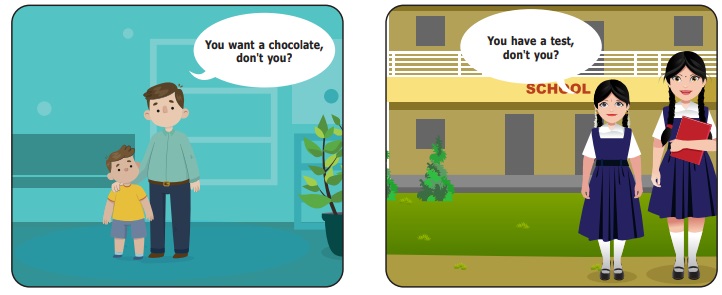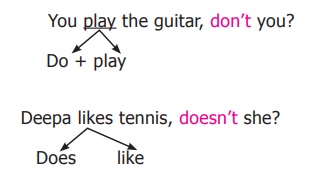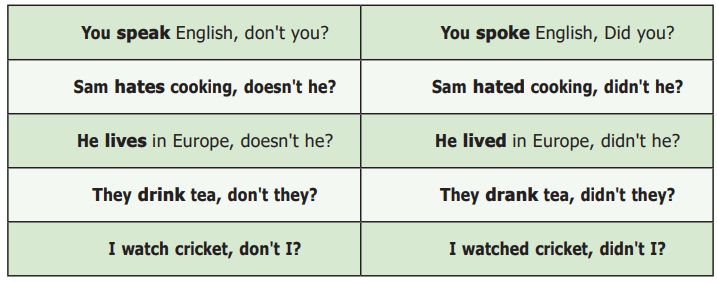Question Tag, Sentences : Simple, Compound, and Complex - Grammar | 8th English : Unit 7 : Prose : Cyber Safety
Chapter: 8th English : Unit 7 : Prose : Cyber Safety
Grammar
GRAMMAR
QUESTION TAG
WHAT?
Question
tags are short questions at the end of the statements.

Look at the following pictures

i) Father asks his son to confirm whether he wants a chocolate. He needs confirmation.
ii) Suganya asks her friend to confirm that she has a test tomorrow.
That’s how tags are used to confirm that
something is true or not and to encourage a reply from the person we are speaking
to.
How
it formed?
Tags are formed with the auxiliary
or modal verb, from the given statement with the appropriate subject (Pronoun)
Auxiliary /modal + n’t + Pronoun
Negative auxiliaries and verbs in tags are usually in the contracted form ‘n’t.
Contractions

A. Positive statement is followed by a negative question tag.

EXAMPLES
* She is a doctor, Isn’t she?
* The books are interesting, aren't they?
* I can swim, can't I?
* We should obey the elders, shouldn't we?
* Once the car was costly, wasn't it?
B. A negative statement is followed by a positive question tag.

EXAMPLES
* We don't have enough time,
do we?
* He is not playing well, is he?
* You were not listening, were you?
* Chandini hadn't seen you before, had she?
* Children shouldn't watch TV too much, should they?
C. If the sentence has no auxiliary verb
When the
statement is in simple present, we form the question tag with do/does.

When the statement is in simple past, we form the question tag with
did.


D) Statements using barely, hardly, rarely, scarcely, neither, no, nobody, none, nothing and seldom are treated as negative statement.
E) Some special cases
* He hardly works, does
he?
* She rarely comes late,
does she?
* They seldom speak, do
they?
* He told nothing, did
he?
* I am – I am a student, aren't I?
but I am not a student, am
I?
* Let's type sentences has the tag
shall we
Let's go home, shall we?
* Affirmative Imperative has the tag will you / won't you
Read the book, will you?
* Everyone / Everybody / nobody / somebody / anybody take plural
verb in tag Everyone is perfect, aren't they?
* Negative imperative has the tag will you
Don't come late tomorrow,
will you?
* Nothing has the tag 'it' in the affirmative
* This / That - These / Those
have the tag isn't it - aren't they
This article is very good,
isn't it?
* There is / They are have the tag isn't here - aren't there
There are some books on the
table, aren't there?
EXERCISE
a. Fill in the blanks with suitable tags.
1. She is collecting stickers, Isn’t she?
2. We often watch TV in the afternoon, don’t we?
3. You
have cleaned your bike, haven’t you?
4. John and Max don't like
maths, do they ?
5. Peter played handball yesterday, didn’t he?
6. They are going home from
school, aren’t they ?
7. Mary didn't do her homework
last Monday, did she ?
8. He could have bought a
new car, could’t he ?
9. Kevin will come tonight, won’t he ?
10. I'm clever, aren’t I ?
b. Fill in the blanks with suitable tags.
1. He is still sleeping, ________
a) is not he?
b) isn't he?
c) wasn't he?
[Answer: b) isn’t
he?]
2. You go to school, ________
a) do you?
b) aren't you?
c) don't you?
[Answer: c) don’t
you?]
3. Let's go for a walk, ________
a) shall we?
b) shan't we?
c) will we?
[Answer: b) shan’t we?]
4. We won't be late, ________
a) won't we?
b) will we?
c) are we?
[Answer: b) will we?]
5. Nobody called, ________
a) do they?
b) didn't they?
c) did they?
[Answer: b) didn’t
they?]
6. They will wash the car, ________
a) will it?
b) won't they?
c) wouldn't they?
[Answer: b) won’t
they?]
7. We must lock the doors, ________
a) mustn't they?
b) shouldn't we?
c) mustn't we?
[Answer: c) mustn’t
we?]
8. I'm
right, ________
a) amn't I?
b) am not I?
c) aren't I?
[Answer: c) aren’t
I?]
9.
So you bought a car, ________
a) did you?
b) haven't you?
c) weren't you?
[Answer: c) weren’t
you?]
10. You wouldn't like to invite
my Dad, ________
a) did you?
b) would you?
c) won't you?
[Answer: b) would
you? ]
SENTENCES : SIMPLE, COMPOUND,
AND COMPLEX
Simple sentence
A Simple sentence is one which
has only one Subject and one Predicate.
Example:- His courage won him honour.
He
must work very hard to win the first prize.
With
a great effort he lifted the box.
Hearing
their father's footsteps, the boys ran away.
The
man, being very hungry, ate too much.
Compound sentence
A Compound sentence is one
made up of two or more Principal or Main Clauses.
Example:- The moon was bright and we
could see our way.
Night
came on and rain fell heavily and we all got very wet.
I shall do it now or I shall
not do it at all.
He threw the stone but it
missed the dog.
I both thanked him and rewarded
him.
You
must hurry, or you will miss the train.
Give me the book and I will
read it.
I
ran all the way to the station but I missed the train.
Complex Sentence
A Complex sentence consists
of one Main Clause and one or more Subordinate Clauses.
Example:- They rested when evening came.
If
he is at home, I shall see him.
I have found the book that
I had lost.
We selected this bicycle after
we had tried several times.
Once
upon a time a man owned a hen which laid every day a golden egg.
The
evil that men do lives after them.
A. State
which of the following sentences are Compound, and which are Complex.
1. Man proposes, but God disposes.
2. I went because I was invited.
3. Jancy returned home because she was tired.
4. Whatever you do, do well.
5. Listen carefully and take notes.
6. I called him, but he gave me no answer.
7. The town in which I live is very large.
8. They always talk who never think.
9. We must eat to live, but we should not live to eat.
10. Govern your passions or they will govern you.
GRAMMAR-ADDITIONAL
SIMPLE, COMPOUND, AND
COMPLEX
A. State which of the following
sentences are simple, compound, complex :
1. The baby cried for
food.
[Answer: Simple sentence]
2. They spoke to him
in Spanish, but he responded in English.
[Answer: Compound sentence]
3. Hearing their
cries, we came out.
[Answer: Simple sentence]
4. They ate too much
yesterday.
[Answer: Simple sentence]
5. As we won the
match, we were appreciated by the committee.
[Answer: Complex sentence,]
6. He was poor but
helped everyone.
[Answer: Compound sentence]
7. After reaching
home, he rang to his friend.
[Answer: Complex sentence,]
8. Open the door and
close the windows.
[Answer: Compound sentence]
9. He was the man who
met us yesterday.
[Answer: Complex sentence,]
10. You must hurry or
you will be late to school.
[Answer: Compound sentence]
Related Topics